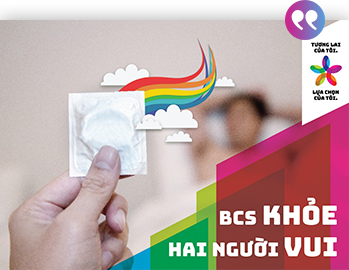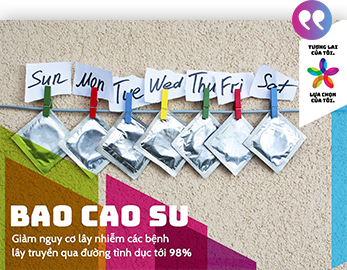
Frequently asked questions about PEP
See all 9 questions
-
 What is PEP?Reply by Xom Cau Vong 8:30 ngày 14/05/2019
What is PEP?Reply by Xom Cau Vong 8:30 ngày 14/05/2019 PEP stands for post-exposure prophylaxis. It means taking antiretroviral medicines (ART) after being potentially exposed to HIV to prevent becoming infected.
PEP stands for post-exposure prophylaxis. It means taking antiretroviral medicines (ART) after being potentially exposed to HIV to prevent becoming infected.
 PEP must be started within 72 hours after a recent possible exposure to HIV, but the sooner you start PEP, the better. Every hour counts. If you’re prescribed PEP, you’ll need to take it once or twice daily for 28 days. PEP is effective in preventing HIV when administered correctly, but not 100%.
PEP must be started within 72 hours after a recent possible exposure to HIV, but the sooner you start PEP, the better. Every hour counts. If you’re prescribed PEP, you’ll need to take it once or twice daily for 28 days. PEP is effective in preventing HIV when administered correctly, but not 100%.
-
 Who should use PEP?
Who should use PEP? PEP is appropriate with people who are HIV-negative or don’t know HIV status, and in the last 72 hours:
PEP is appropriate with people who are HIV-negative or don’t know HIV status, and in the last 72 hours:
- Have been exposed to HIV during sex (for example, if the condom broke),
- shared needles with other unknown HIV people
- were sexually assaulted,
 PEP should be used only in emergency situation and must be started within 72 hours after a recent possible exposure to HIV. When using PEP, you need to take it once or twice daily for 28 days. PEP is not a replacement for other prevention strategies, such as PrEP, correct condom use, and not sharing needles.
PEP should be used only in emergency situation and must be started within 72 hours after a recent possible exposure to HIV. When using PEP, you need to take it once or twice daily for 28 days. PEP is not a replacement for other prevention strategies, such as PrEP, correct condom use, and not sharing needles.
 PEP is effective, but not 100%, so you should continue to use condoms with sex partners and safe injection practices while taking PEP. These strategies can protect you from being exposed to HIV again and reduce the chances of transmitting HIV to others.
PEP is effective, but not 100%, so you should continue to use condoms with sex partners and safe injection practices while taking PEP. These strategies can protect you from being exposed to HIV again and reduce the chances of transmitting HIV to others.
-
 Who may be not relevant for PEP?
Who may be not relevant for PEP?
- Exposing sources are confirmed HIV negative,
- Exposed person is confirmed HIV infected,
- Exposed to non-risk human body fluid: tear, sweat, oral fluid, and urine.
-
 When should I take PEP?
When should I take PEP?
- PEP is used only with doctor’s prescription.
- PEP must be started within 72 hours after a possible exposure. The sooner you start PEP, the better. After 72 hours, PEP is useless.
- If you’re prescribed PEP, you’ll need to take it once or twice daily for 28 days.
-
 Does PEP have any side effects?
Does PEP have any side effects?PEP is safe but may cause side effects like nausea in some people. These side effects can be treated and aren’t life-threatening
-
 What if I forget to take drug while using PEP?
What if I forget to take drug while using PEP?- When prescribed PEP, you must use for 28 days consecutively
- If you forget to take your PEP and remember in less than 24 hours, take the next dose as soon as you remember
- If more than 24 hours have passed, take the next dose you are due to take - don't take double the dose.
- If you miss more than 48 hours, discontinue PEP.
-
 Where can I get PEP?
Where can I get PEP?- Tại TP. Hồ Chí Minh:
- Phòng khám và nhà thuốc G-Link Quận 10: 163/15/6 Tô Hiến Thành, phường 13, Q.10, Tp. Hồ Chí Minh – 093 210 8534
- Phòng khám và nhà thuốc G-Link Thủ Đức: 17 đường số 12, phường Trường Thọ, quận Thủ Đức – 090 388 1705
- Phòng khám đa khoa Galant: 119 Trần Bình Trọng, phường , Q.5, Tp. hCM - 0943 108 138
- Phòng khám và nhà thuốc My Home: 152 Ba Đình, phường 10, Q.8, Tp. HCM -- 0907 538 507
- Tại Hà Nội:
- Phòng khám Đa khoa Light, Tòa nhà Light 2, Lô 22, Khu nhà ở The Premier, Đường Tôn Thất Thuyết, P. Dịch Vọng Hậu, Q. Cầu Giấy, Hà Nội – 0981 135 959
- Tại TP. Hồ Chí Minh:
-
 Can I take a course of PEP every time I have unprotected sex?
Can I take a course of PEP every time I have unprotected sex? - PEP should be used only in emergency situation.
- PEP is not the right choice for people who may be exposed to HIV frequently—for example, if you often have sex without a condom with a partner who is HIV-positive
- Because PEP is given after a potential exposure to HIV, more drugs and higher doses are needed to block infection than with PrEP. PrEP is when people at high risk for HIV take HIV medicines daily to lower their chances of getting HIV.
- If you are at ongoing risk for HIV, speak to your doctor about PrEP
-
 If PEP is available, do I still need to use condoms?
If PEP is available, do I still need to use condoms?- Yes, condoms are the best way of preventing HIV.
- PEP is not a ‘morning after’ pill to stop HIV (as it is not taken just once but must be taken every day for 28 days).
- It is not a replacement for condoms. PEP drugs are powerful, may have side effects and getting PEP is often not easy.
- Condoms on the other hand are cheap (or free), widely available and only need to be used during sex. Condoms also prevent other sexually transmitted infections (STIs) and unwanted pregnancy.
-
 Should I have an HIV test before and after use of PEP?
Should I have an HIV test before and after use of PEP?-
Yes
- Before using PEP, you need to have an HIV test to ensure that you are HIV negative. If the results is “re-active”, that means you are infected with HIV before exposure. You are not eligible for PEP. You need to be linked with HIV care and treatment.
- After PEP course is completed in 8 to 12 weeks, you need to be HIV tested to be sure that no infection has taken place.
- You may also need to be tested for hepatitis and syphilis
-
Yes
If you don’t find the answers to your questions, please drop us an email for further consultation
Or contact us:
Page: 1
Safe sex & Condom use






